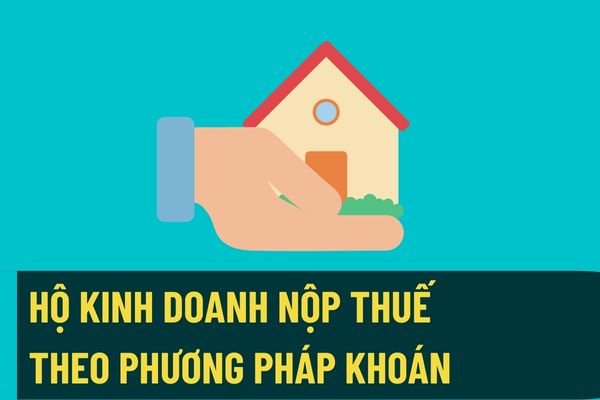Vietnam: If a business household pays presumptive tax, how do they determine the revenue, the presumptive tax rate, and the invoice?
Taxpayers under the presumptive method are regulated in Vietnam?
According to Sentence 16, Manual on electronic invoices No. 2 of Ho Chi Minh City Tax Department of Vietnam provides guidance on taxpayers according to the presumptive method:
The tax authority shall determine the payable tax amount according to the tax presumption method in case business households and individuals fail to implement or fail to fully implement the accounting, invoice, and voucher regime, except for the following cases: Business households and individuals with a scale of revenue and labor that meet the highest standards of micro-enterprises in accordance with the law on supporting small and medium-sized enterprises to implement the accounting regime and pay taxes according to the declaration method.

Vietnam: If a business household pays presumptive tax, how do they determine the revenue, the presumptive tax rate, and the invoice?
How to determine the presumptive revenue and tax rate for business households in Vietnam paying tax by the presumptive method?
According to Question 16, Manual on electronic invoices No. 2 of Ho Chi Minh City Tax Department of Vietnam, the guidance on determining revenue and flat tax rate according to the presumptive method is:
- In Clause 7, Article 3 of Circular 40/2021/TT-BTC of Vietnam guiding:
“Presumptive tax” means a fixed amount of proportional tax on a fixed amount of revenue determined by the tax authority as prescribed by Article 51 of the Law on Tax Administration.
- In Section 1, Appendix I, the list of business lines for calculating value-added tax and personal income as a percentage of turnover for business households and individuals, promulgated together with Circular 40/2021/TT -BTC guides that the tax rate for goods wholesale and retail activities (except for the value of goods sold by agents at the right price to enjoy commission) is 1% for value-added tax and 0.5% for personal income tax.
- Based on the above instructions, for flat households, tax authorities determine revenue and flat tax rates on the basis of the business household's declaration, the tax branch's database, and opinions of the Advisory Council on commune/ward/township, general economic development of the area.
- Business households will pay flat tax as notified by tax authorities from the beginning of the year.
- If there is a change in production and business activities during the year (increasing/decreasing the scale, stopping or suspending business), the tax authority will adjust the revenue and the flat tax rate according to reality.
- For goods retailing activities (grocery products), in addition to value-added tax and personal income, business households must also pay a one-time course fee from the beginning of the year at the rate of VND 300,000/year if the revenue is over VND 300,000 per year if the turnover is over 100 million to 300 million VND/year; the level of 500,000 VND/year if the turnover is over 300 million to 500 million VND/year; the level of 1 million dong/year if the revenue is over 500 million dong/year (in Decree 139/20216/ND-CP regulating license fees).
What is the invoice and voucher regime for contracted households according to Vietnamese regulations?
According to Question 16, Manual on electronic invoices No. 2 of Ho Chi Minh City Tax Department of Vietnam, instructions on the invoice and voucher regime for contracted households are:
- Business households and individuals that pay tax by the presumptive method (household contracts) are not required to comply with the accounting regime.
- Households using separate invoices must store and present to the tax authorities invoices, documents, contracts and documents proving that goods and services each time.
- Particularly in the case of contracted households doing business at border markets, border-gate markets, or markets in border-gate economic zones in the Vietnamese territory, they must archive invoices, contract documents, and documents proving the conformity of goods. law and present it at the request of a competent state management agency.
- Business households and individuals paying tax according to the presumption method (households) have the need to use invoices, the tax authorities shall issue an electronic invoice with the tax authority's code each time it is incurred after the household declare and pay tax according to regulations.
- Tax declaration dossiers for flat households as prescribed at Point 8.1, Appendix I - The list of tax declaration dossiers issued together with Decree 126/2020/ND-CP dated October 19, 2020 of the Government is the Declaration Tax for business households and individuals using form No. 01/CNKD issued together with Circular 40/2020/TTBTC.
- In case a flat household uses an invoice issued by a tax authority and retails it for each time it is incurred when declaring tax on revenue on a single invoice, the flat household declares tax for each time it is incurred and uses a tax return for business households and individuals, using form No. 01/CNKD issued together with Circular 40/2020/TT-BTC, and simultaneously present and submit the following documents to the tax return file:
- A copy of the economic contract for the provision of goods and services in the same industry as the business of the contracted household;
- A copy of the minutes of acceptance and liquidation of the contract;
- Copies of documents proving the origin of goods or services such as:
+ A list of agricultural products, if they are domestic agricultural products; A list of goods purchased, sold, and exchanged by border residents if they are imported by border residents;
+ Invoice delivered by the seller if the goods are imported and purchased from a domestic business organization or individual; relevant documents to prove if the goods are self-manufactured or provided by individuals; ...
- Tax authorities have the right to request the presentation of the original for comparison and confirmation of the accuracy of the copy against the original.
Download Handbook on Electronic Invoice No. 2: Here.
LawNet
